
FOLIA GEOBOTANICA
Scope & Guideline
Innovating insights into ecological and evolutionary patterns.
Introduction
Aims and Scopes
- Plant Ecology and Functional Traits:
The journal investigates the ecological roles of plants, emphasizing functional traits and their implications for community structure, species interactions, and ecosystem functioning. - Biodiversity and Conservation:
Research on the diversity of plant species, especially in biodiversity hotspots, along with conservation strategies, is a key focus, highlighting the importance of preserving unique flora. - Responses to Environmental Change:
Studies examining how plants and ecosystems respond to environmental stressors, such as climate change, land use, and invasive species, are prevalent, contributing to understanding resilience and adaptation. - Long-term Ecological Studies:
The journal values long-term ecological research that provides insights into temporal changes in vegetation, aiding in the understanding of ecological processes and historical landscape dynamics. - Soil-Plant Interactions:
Research on belowground dynamics, including soil seed banks and root traits, is emphasized, reflecting the critical role of soil in plant health and ecosystem services.
Trending and Emerging
- Soil Seed Banks and Restoration Ecology:
Research on the role of soil seed banks in biodiversity restoration, especially in degraded ecosystems, is gaining traction, highlighting the importance of regenerative practices. - Functional Ecology of Belowground Traits:
There is an increasing emphasis on the functional ecology of belowground plant traits, including root architecture and belowground organ strategies, reflecting their significance for plant survival and ecosystem resilience. - Impacts of Human Activities on Biodiversity:
Studies exploring the consequences of anthropogenic influences, such as land use changes and habitat fragmentation, on plant communities are becoming more frequent, addressing urgent conservation issues. - Invasive Species Management:
Research targeting the management and ecological impacts of invasive species is on the rise, as understanding their role in ecosystems becomes critical for biodiversity conservation. - Climate Change Adaptation Strategies:
Emerging themes include investigating how plant species adapt to climate change, focusing on resilience mechanisms and strategies to enhance conservation efforts.
Declining or Waning
- Taxonomic Studies of Common Species:
There is a noticeable decline in studies focusing on the taxonomy of widely distributed or common plant species, as the journal shifts towards more ecological and conservation-oriented research. - Effects of Single Environmental Factors:
Research that isolates the impact of single environmental factors on plant communities is waning, with a trend towards multi-factorial studies that consider complex interactions. - Traditional Phytogeography:
The focus on classical phytogeographical studies, which map plant distributions without integrating ecological dynamics or conservation aspects, seems to be decreasing in favor of more integrative approaches.
Similar Journals

PLANT SPECIES BIOLOGY
Advancing Plant Science Through Rigorous ResearchPLANT SPECIES BIOLOGY, published by WILEY in the United Kingdom, is a prominent journal dedicated to advancing the understanding of plant species, their biology, ecology, and roles within ecosystems. With an impressive convergence of research dating back to 1986 and extending through 2024, this journal caters specifically to specialists in the fields of plant science and ecology. The journal's current impact factor further underscores its significance, ranking in the Q2 quartile across three relevant categories: Ecology, Ecology, Evolution, Behavior and Systematics, and Plant Science. As a member of the Scopus ranks, it holds respectable positions within its categories, evidencing its contribution to impactful scientific discussions and knowledge. Although it is not an open-access journal, PLANT SPECIES BIOLOGY provides essential insights, fostering interdisciplinary dialogue and discovery for researchers, professionals, and students dedicated to exploring the complexities of plant species and their ecosystems.
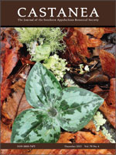
CASTANEA
Championing Research in Tree Ecology and ConservationCASTANEA is a distinguished journal published by the SOUTHERN APPALACHIAN BOTANICAL SOCIETY in affiliation with NEWBERRY COLLEGE. With an ISSN of 0008-7475 and an E-ISSN of 1938-4386, this esteemed publication serves as a vital platform for researchers and practitioners in the field of Plant Science. It has been circulating since 1982, and its scope focuses on the study of trees, their ecology, and conservation, thereby contributing significant insights into the biodiversity of the Southern Appalachian region and beyond. Despite its current ranking in the Q4 quartile and the 5th percentile in the Scopus Agricultural and Biological Sciences category, CASTANEA is committed to advancing knowledge and fostering a deeper understanding of plant sciences among academics and students alike. The journal does not currently offer Open Access options, maintaining a traditional subscription model that allows for carefully curated and peer-reviewed content. As you explore the advances in plant biology through CASTANEA, you will find an invaluable resource that supports both emerging and established scholars in their research endeavors.
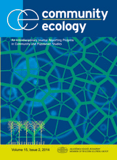
COMMUNITY ECOLOGY
Connecting Research to Ecological SolutionsCOMMUNITY ECOLOGY is a distinguished journal published by Springer Heidelberg that focuses on the intricate dynamics of ecological interactions within communities. Established in 2000 and continuing robustly through to 2024, this journal aims to disseminate significant research findings that contribute to the understanding of ecological processes, species interactions, and community structures. With an ISSN of 1585-8553 and an E-ISSN of 1588-2756, the journal holds a commendable position in the academic sphere, reflected in its Q2 quartile rankings in the categories of Ecology and Ecology, Evolution, Behavior and Systematics. It boasts an impressive Scopus ranking within the 57th percentile for both Agricultural and Biological Sciences and Environmental Science fields, attesting to its relevance and influence. Though it does not currently operate under an open access model, COMMUNITY ECOLOGY remains a vital resource for researchers, professionals, and students eager to advance their knowledge in community ecology, highlighting the importance of collaborative research in addressing ecological challenges globally.
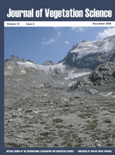
JOURNAL OF VEGETATION SCIENCE
Elevating understanding in plant science and ecology.JOURNAL OF VEGETATION SCIENCE, published by Wiley, stands as a premier platform for disseminating high-quality research within the fields of ecology and plant science. With an impressive rank of #80 out of 516 in Plant Science and #81 out of 461 in Ecology according to Scopus, this esteemed journal is recognized for its significant contributions to advancing knowledge and understanding of vegetation dynamics and biodiversity. Since its inception in 1990, JOURNAL OF VEGETATION SCIENCE has been committed to providing a forum for researchers, professionals, and students to share their findings and engage in critical discussions about the ecological implications of vegetation studies. While this journal does not currently offer open access, it maintains a reputable impact factor, illustrating its importance in contemporary ecological and botanical research. With its Q1 categorization in both Ecology and Plant Science for 2023, it continues to shape and influence the discourse in these disciplines through rigorous peer-reviewed articles, reviews, and synthesis papers.
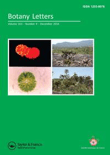
Botany Letters
Advancing Plant Science through Open Access InnovationBotany Letters, published by Taylor & Francis Ltd, is a prominent journal in the field of Plant Science based in the United Kingdom. With its ISSN 2381-8107 and E-ISSN 2381-8115, the journal has established itself as an essential resource for researchers, professionals, and students alike, focusing on innovative studies and findings in botany. As a Q2 ranked journal in its category (2023) and holding a respectable Scopus rank of #200 out of 516 in Agricultural and Biological Sciences, it reflects a robust commitment to quality and relevance in the field. The journal's open access model ensures that groundbreaking research is readily accessible, fostering collaboration and knowledge sharing among the global scientific community. Covering a broad spectrum of topics within plant science from 2016, Botany Letters aims to catalyze advancements in the understanding and management of plant biodiversity and sustainability, ultimately contributing to conservation efforts and agricultural innovation.
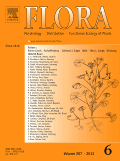
FLORA
Exploring the Depths of Plant Science and EcologyFLORA is a distinguished journal published by Elsevier GmbH, focusing on the realms of Ecology, Plant Science, and Evolutionary Biology. Established in 1975, this journal has been a vital platform for researchers and professionals, disseminating groundbreaking findings and insights relevant to the plant sciences. With an impressive impact factor and a current Scopus ranking placing it in the second quartile (Q2) across multiple categories, FLORA is recognized as a critical resource for advancing knowledge in its respective fields. The journal publishes both traditional research articles and significant review papers, ensuring a broad spectrum of academic engagement. Although not open access, FLORA remains committed to enhancing the scientific discourse and fostering collaboration among scholars worldwide. Researchers seeking to enrich their understanding of ecological dynamics and plant biology will find FLORA to be an essential addition to their academic repertoire.
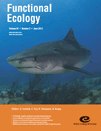
FUNCTIONAL ECOLOGY
Decoding Ecosystem Dynamics for Tomorrow's ChallengesFUNCTIONAL ECOLOGY is a premier journal published by WILEY that delves into the intricate relationships of organisms and their environments, addressing key themes in ecology, evolution, behavior, and systematics. Established in 1987, this influential publication has made strides in both foundational research and applied science, boasting a remarkable impact factor that positions it in the Q1 category for Ecology, Evolution, Behavior, and Systematics. With a Scopus ranking of #48 out of 721 in its field, it represents the cutting edge of ecological research, appealing to a diverse audience that includes researchers, professionals, and students striving to comprehend and address ecological challenges. Although the journal does not currently provide Open Access options, it remains a vital resource for those looking to deepen their understanding of functional ecology and its practical applications in sustainability and conservation. Join the community of scholars advancing ecological knowledge and its relevance in today's rapidly changing world.

OIKOS
Championing high-impact research in the heart of ecology.OIKOS is a leading journal dedicated to the field of Ecology, Evolution, Behavior, and Systematics, published by WILEY in the United Kingdom. Since its inception in 1973, OIKOS has established itself as a vital platform for researchers seeking to advance their understanding of ecological interactions and evolutionary processes, with its impact reflected in its prestigious Q1 classification in the 2023 Scopus rankings. The journal's dedication to high-quality research is exemplified by its robust ranking of #106 out of 721 in the relevant categories, situating it within the top 15% of journals globally. With a commitment to disseminating influential findings, OIKOS encourages the open exchange of ideas among a diverse range of scholars, making it an essential resource for academics, professionals, and students alike. Whether you are interested in innovative ecological theories or applied research with real-world implications, OIKOS provides a rich repository of knowledge to inform and inspire your work.

PRESLIA
Bridging Research Gaps, Inspiring DiscoveryPRESLIA, published by the Czech Botanical Society, is an esteemed academic journal that has been contributing to the fields of Ecology and Plant Science since its inception in 1979. With an impressive Q1 ranking in both categories for 2023, it stands out among its peers as a vital resource for researchers, professionals, and students alike. The journal is dedicated to disseminating high-quality research that advances our understanding of botanical sciences, encompassing a diverse array of topics from plant ecology to conservation strategies. With a ranking of #110 out of 516 in Plant Science and #103 out of 461 in Ecology on Scopus, PRESLIA consistently maintains a high impact, reflecting its crucial role in shaping contemporary scientific discourse. While traditional access options are available, the journal's commitment to fostering academic collaboration makes it a key player in the global scientific community. Located in Prague, Czech Republic, PRESLIA continues to bridge gaps in research and offers a platform for innovative scholarly communication up until 2024 and beyond.

Acta Botanica Mexicana
Advancing ecological knowledge through innovative research.Acta Botanica Mexicana is a premier journal published by Instituto de Ecología AC, dedicated to advancing research in the fields of ecology, plant science, and biological sciences. With an E-ISSN of 2448-7589, this open-access journal facilitates extensive dissemination of scientific findings, ensuring that knowledge is accessible to researchers, professionals, and students worldwide. Established in 2008, Acta Botanica Mexicana has earned a notable reputation, achieving a Q3 ranking in plant science and a Q4 ranking in ecology and evolution for 2023. This positioning underscores its commitment to publishing high-quality research that addresses vital issues in ecological and botanical studies. With a focus on innovative methodologies and pragmatic solutions, the journal invites contributors to share their insights and findings, thus enriching the academic landscape and fostering collaborations that drive the field forward. The journal is based in Michoacán, Mexico, and serves as a key hub for researchers engaging with the challenges and intricacies of plant and ecological studies.